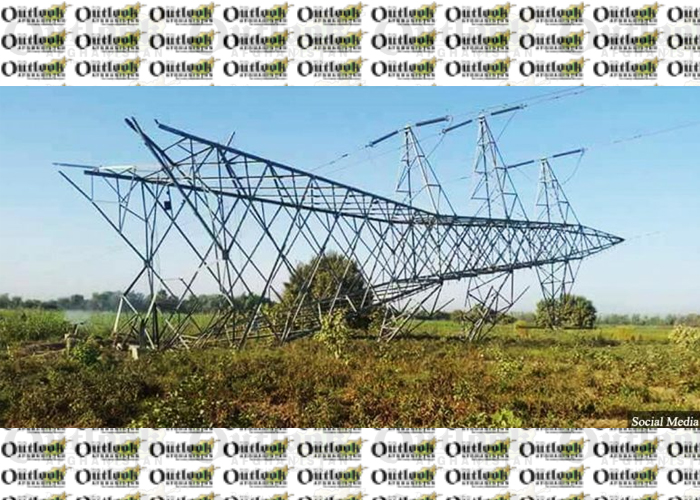The Successive Power Outage and Public Anger in Afghanistan
Unfortunately, the destruction of power pylons has become a chronic problem in Afghanistan. Since 2018 and 2019 the enemies of enlightenment have been successively putting pressure on the government and people through darkening and interrupting the normal lives of people in most parts of the country. The latest incident took place last Monday when a power pylon was destroyed in Ahangaran area pertained to Salang district in the north part of the country. In general, at least 19 - 22 power pylons have been destroyed in recent months while after each incident the electricity cut off from 8 to 11 provinces of the country, and nearly 4 million Afghanis expenses imposed on Da Afghanistan Breshna Sherkat in repairing each power pylon. Nevertheless, there is no certainty to see the end of the chronic issue in the country.
Unluckily, the security forces have frequently failed to protect the power pylons, local companies and people in the country. Except in one case that someone known as Salang Mamati was arrested a few years ago, the security institutions and intelligence has not succeeded to identify the responsible hands behind the successive power outage. In recent cases, it is said that the perpetrators of the power pylon destruction asked $ 3.5 million as ransom from Da Afghanistan Breshna Sherkat (DABS). The security officials repeatedly accused the Taliban of the destructive deeds, but the Taliban has regularly refused the responsibility of power pylons destruction. As a consequence, the normal people have frequently interrupted imposing billions of direct and indirect costs on the people.
The security officials must note that the people are really tired of the weakness of the intelligence, and security institutions. Every day, there is a security event such as targeting civilians, assassinating social and political activists, destruction of power pylons, occurring fire events, and so on. If we look just at recent fire events in Kabul, Herat, and Farrah provinces, billions of dollars were imposed on the traders and already suffering people. Based on an official report, nearly 500 million economic losses were only inflicted on Islam Qala ports in Herat province after setting terrible fire ignited 435 trucks of goods and 500 tankers of oil and gas. Therefore, the people are really disappointed by the security officials and so sometimes they refer to the Taliban to investigate their cases, and other times they call the international community and international organizations to address their problems.
The Da Afghanistan Breshna Sherkat instead of expanding electricity projects in the country has been busy in the repair of the destroyed power pylons. Now, more than 80% of the power is importing from neighboring countries such as Tajikistan, Uzbekistan, Kazakhstan, and Iran. Still, the company has been unable to provide stable power to Kabul which is the capital of the country. Kabul needs around power but the responsible company has not been able to supply more than 350 Megawatt power in the capital city. The destruction of power pylons has not only inflected millions of losses on Breshna Company due to frequent repair and destruction of power bases but also inflected millions of losses on local companies because of job disruption.
However, the power outage crisis is not confined to the security factor in Afghanistan. As pointed out, there are other factors such as corruption, poor management of the Da Breshna Sherkat, insufficient human capacity, corruption, unequal distribution, electricity shortage not paying electricity bills by powerful people, and lack of a strategic plan for producing power inside the country, but the root factor is lack of insecurity, lack of local investment and electricity shortage, especially during the peak hour during the hot and cold seasons. As a consequence of this condition, hundreds of local companies have collapsed in recent years, and the level of unemployment and poverty the extremely increased in the country. Anyway, the power interruptions have caused a lot of public anger in the country. With emerging the third wave of covid-19, people are increasingly in need of oxygen, but the companies that produce oxygen are faced with electricity disorders. In recent days after the repeated outrage of power, there have public complaints because of oxygen shortage. The citizens not only criticize the security and intelligence institutions because of failure in the protection of people, companies, and power pylons but also criticize Breshna Sherkat because of poor management and unequal power distribution in the country. The residents complained that the company does not equally provide electricity during the outage while the powerful people had 24-hour electricity though they pay no electricity bills. The Kabul residents say DABS supplies electricity only to palace-dwellers, government officials, and powerful people, not for every home in the remote areas of the city, as witnessed in outage times.
Therefore, both security forces and Da Breshna Sherkat should not be indifferent anymore about the chronic problem. Da Breshna Sherkat should and other officials need to note that currently imported from the neighboring countries can not satisfy the needs of people though they pay millions of dollars, and the security officials need to note that the people are tired of the current chaotic condition. This is a long time that the families, local companies, businesses, and health centers are all suffering from the power shortage. As abovementioned, Kabul, as a large developing city of Afghanistan, with nearly 7 million population needs around 700mega watt power but it receives some 300/400-megawatt power for the whole families, government offices, ministries, producing companies, business, health centers, and so on. Several years ago, Da Brishna Company promised to solve the problem but nothing has changed yet.
Home » Opinion » The Successive Power Outage and Public Anger in Afghanistan
The Successive Power Outage and Public Anger in Afghanistan
| Mohammad Zahir Akbari

